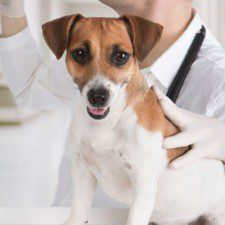Did you know that dogs can develop many of the same dental problems as people can? Gum disease, for instance, is very widespread among our canine friends: nearly 80% of dogs have this dangerous disease. Not only can dental issues be very painful for our furry pals, they can also lead or contribute to more serious health problems. Fido can’t tell you if his teeth hurt, so, as a responsible pet owner, you’ll need to know what to watch out for. Below, a London, ON veterinarian lists some of the most common symptoms of dental problems in dogs.
Bad Breath
Bad breath is one of the most common indications of dental issues in our canine companions. While Man’s Best Friend has never been known for having mint-fresh breath and pearly-white teeth, his doggy kisses shouldn’t leave you gagging, either.
Bloody, Ropy, Or Excessive Saliva
Some dogs are naturally, well, a bit slobbery, but if you notice that Fido is drooling more than he used to, have your vet examine his teeth. Ropy or bloody saliva can also be indicative of dental issues.
Lack Of Interest in Toys/Playing
If Fido’s teeth hurt, he may lose interest in his chew toys. He also may not be as enthusiastic about playing games like fetch or Tug-O-War.
Visible Buildup
If you can see yellow or brown gunk on Fido’s teeth, there’s a good chance that your furry pal needs some dental work. A good cleaning can remove that tartar, which will reduce bacteria and inflammation and help fight infection.
Swelling
Check your pup’s mouth regularly for bumps or swelling. Visible swelling around Fido’s mouth, or on his gums, is another red flag.
Nasal Discharge
A runny nose can also indicate doggy dental woes. Fido may also sneeze more often if he has problems with his teeth.
Loss/Change of Appetite
Fido may have trouble chewing if his teeth hurt. Your canine pal may eat more slowly than he used to, or he may start preferring softer food. It’s worth noting that a lack of appetite can be symptomatic of several different health problems in dogs, so if your furry friend isn’t interested in his supper, contact your vet immediately.
If your canine pal has any of these symptoms, please contact us, your local London, ON vet clinic, right away to schedule an appointment. We are always happy to help!






